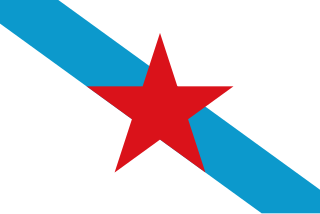Galician-language literature is the literature written in Galician. The earliest works in Galician language are from the early 13th-century trovadorismo tradition. In the Middle Ages, Galego-português (Galician-Portuguese) was a language of culture, poetry (troubadours) and religion throughout not only Galicia and Portugal but also in the Castile-León region.

The Galician Nationalist Bloc is a political party from Galicia, formed with the merger of a series of left-wing Galician nationalist parties. It is self-defined as a "patriotic front".
The Galician People's Union is a Galician nationalist and communist political party, and is one of the registered political parties of Spain. The party publishes the magazine Terra e Tempo, and the secretary general is Néstor Rego.

Vicente Martínez Risco Agüero was a Galician intellectual of the 20th century. He was a founder member of Xeración Nós, and among the most important figures in the history of Galician literature. He is well regarded for his writings on Galician nationalism, as well as a contributor to the Galician New Narrative. He is also the father of Spanish novelist and critic Antonio Risco.

Galician nationalism is a form of nationalism found mostly in Galicia, which asserts that Galicians are a nation and that promotes the cultural unity of Galicians. The political movement referred to as modern Galician nationalism was born at the beginning of the twentieth century from the idea of Galicianism.
The Partido Galeguista was a Galician nationalist party founded in December 1931. It achieved notoriety during the time of the Spanish Second Republic. The PG grouped a number of historical Galician intellectuals, and was fundamental in the elaboration of the Galician Statute of Autonomy.
The literature written by Galician authors has been developed in both Galician language literature and Spanish literature. The earliest works written in Galician language are from the early 13th-century trovadorismo tradition. In the Middle Ages, Galego-português (Galician-Portuguese) was a language of culture, poetry (troubadours) and religion throughout not only Galicia and Portugal but also Castile.

Renewal–Nationalist Brotherhood is a political party in Galicia. Formed in 2012, under the guidance of historical leader Xosé Manuel Beiras, Anova was formed by Encontro Irmandiño, the FPG, Movemento pola Base, the Galician Workers Front, and independents. Anova defines itself as a Galician nationalist, socialist, feminist, ecologist, internationalist organization and advocates for Galician independence. Its internal organization is run by assemblies.
The Assembly of the United People (APU) was a Galician political organization, with an independentist, socialist and feminist ideology. It was formed in 1989 from a split of the first Galician People's Front, and disappeared with its self-dissolution in 1995.

The Galician Movement for Socialism was a Galician communist, pro-independence and feminist organization. The MGS was born in March 2009, although its origins go back to the summer of 2006. The MGS works inside the Galician Nationalist Bloc and the Confederación Intersindical Galega.

The Galician National-Popular Bloc was a Galician electoral candidacy. It had as the national sovereignty for Galiza as its main objective and as an alternative to autonomism. It was formed by the Galician People's Union (UPG) and Galician National-Popular Assembly (ANPG).
The Galician People's Assembly was a political organization founded on October 10, 1976 by a splinter group of the Galician National-Popular Assembly. The APG considered AN-PG to close to the Galician People's Union. Its leaders were Xan López Facal, César Portela, Carlos Vázquez and Mario López Rico. The organization held its first congress in December 1976. The APG supported the Galician Socialist Party, a splinter of the agrarian union Comisións Labregas, called Comisións Labregas Terra and the Comités de Traballadores Galegos. The APG participated in the launching of the magazine Teima (1976-1977). The APG ceased to exist on December 4, 1977; that same year part of his membership helped to found the Galician Workers Party (POG).
Dereita Galeguista was a right-wing Galician nationalist party active in the final months of the Second Spanish Republic.

Encontro Irmandiño is a political organization that is part of Anova-Nationalist Brotherhood in Galicia, Spain. It used to be an internal current in the Galician Nationalist Bloc (BNG). EI was founded in 2007 and has an ideology based in Galician nationalism, direct democracy, anticapitalism, feminism and alter-globalization.
The Galician Workers Union, was a Galician nationalist and anticapitalist union in Galiza.

Sindicato Labrego Galego-Comisións Labregas is a Galician farmers' and breeders' union centered on family farms and small peasants.
Communist Movement of Galicia was a communist political party created in Galicia during the last years of the dictatorship of Franco as the Galician section of the Communist Movement, although in practice the MCG acted as an independent party. The leaders of the MCG were Xesús Veiga Buxán and Carmen Santos Castroviejo. Unlike other sections of Spanish left-wing political parties, the MCG was close to the Galician nationalist movement and supported self-determination and national sovereignty for Galicia.
Movemento pola Base is a Galician pro-independence and left-wing political organization. The MpB was born in the summer of 2006 from a group of militants of the Galician Nationalist Bloc (BNG), critical with the political line of the organization at the time.
The Socialist Party of National Liberation was an independentist and communist party active in Catalonia. The PSAN was created in 1968 following a split in the more leftist sector of the National Front of Catalonia. Initially it was only present the Catalonia, but later also gained presence in the french region of Roussillon, the Valencian Community and the Balearic Islands. The party was illegal and clandestine until 1978, when all parties were fully legalised, after the Franco Dictatorship.

Manuel María Fernández Teixeiro, better known as Manuel María, was a Spanish poet and academic who wrote in the Galician language. He was notable for his combative character and his political commitment. His poetry touched on themes of love, art, his own political commitment, drawing attention to wrongs, ethnography, physics, history, immateriality, mythology, the animal world, poetic expression, the passing of time, religion, society, language, agricultural labour, urbanism, and geography. The Day of Galician Literature was devoted to him in 2016.








